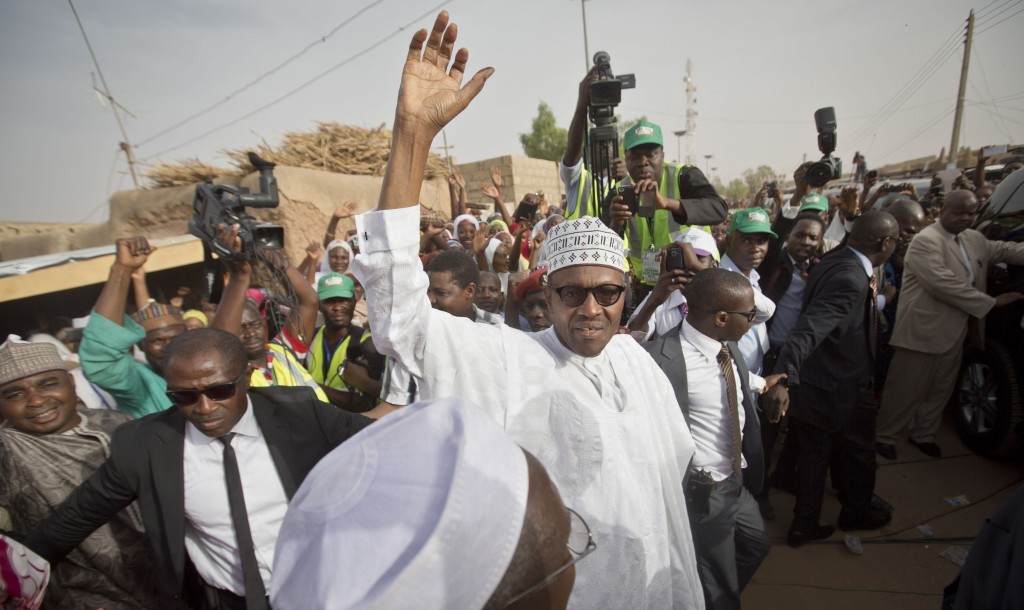
Nigeria deployed police and soldiers to gasoline stations to maintain order as fuel shortages grip Africa’s biggest oil producer.
The most severe fuel scarcity in a year in Africa’s most populous nation has left motorists paying more than double the government’s official price for gasoline and put increasing pressure on a stagnating economy that’s been hit by tumbling oil prices.
The national statistics office blames the shortages, which have been on and off since May and have peaked again in
the last month, for contributing to an 8 percent drop in labor productivity in the fourth quarter.
“The fuel industry is holding the whole economy to ransom,” Nema Ramkhelawan-Bhana, an analyst at Rand Merchant Bank in Johannesburg, said by phone.
“Nigeria is already suffering from low oil prices, and now fuel shortages are exacerbating the problem.”
The latest fuel crisis has been worsened by central bank foreign-exchange controls that have left retailers paying higher costs to import supplies at a time when President Muhammadu Buhari’s government has removed subsidies and imposed a price cap at 87 naira a liter ($1.67 a gallon).
As a result, gasoline is scarce, and the average cost on the market was 135 naira a liter in March, the highest since the country’s National Bureau of Statistics began compiling such data in June 2014.
Half of the 60-member Depot and Petroleum Products Marketers Association owe international gasoline suppliers $1.2 billion due to insufficient foreign-exchange sales by the central bank, the group’s executive secretary, Olufemi Adewole, said by phone Wednesday.
“Unless we have adequate FX and our refineries are functioning, there will be product scarcity,’’ he said.
The shortages are undermining Buhari’s bid to kick-start the oil-dependent economy with a record 6.1 trillion-naira budget.
Growth is expected to slow to 2.3 percent this year from a 16-year low of 2.8 percent in 2015, according to the International Monetary Fund.
“The fuel shortage has reached levels where people are either having to temporarily close down their offices or to reduce their working hours,” Manji Cheto, an analyst at Teneo Intelligence in London, said in e-mailed responses to questions.
“The effect of this on economic activities is obviously negative; the manufacturing sector, which has already taken a major hit in the last quarter, remains quite vulnerable.”
Drivers in Kano, the main city in the north, have been spending entire days in lines stretching a mile, and in Abuja, the capital, police have been deployed to reduce chaos around filling stations.
“The security people you see at filling stations are there to keep law and order,” Nigerian National Petroleum Corp. spokesman Garba Deen Muhammad said by phone on Tuesday.
In northeastern Adamawa state, gasoline sold for as much as 300 naira a liter earlier in the month, pushing up an inflation rate that reached an almost four-year high of 12.8 percent in March.
While Nigeria is pumping more than 1.8 million barrels of oil per day, the West African nation doesn’t have adequate refining capacity and imports at least 70 percent of demand.
On April 19, Buhari’s administration invited tenders to rehabilitate and operate its four refineries, and build new ones as part of a long-term plan to reduce fuel imports.
NNPC spokesman Muhammad said fuel supplies were boosted this week. “We should return to normal in a few weeks,” he said.
In the meantime, the state minister for petroleum resources, Ibe Kachikwu, said he asked international energy companies including Total SA, Exxon Mobil Corp. and Royal Dutch Shell Plc. to provide foreign currency to retailers to enable them to import more.
“They are in effect asking companies to subsidize them,” John Ashbourne, an economist at London-based Capital Economics Ltd., said by phone.
“I don’t see how that will work.”